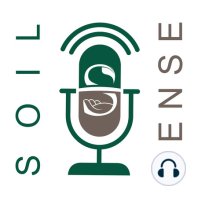26 min listen
Managing Low pH Soils with Ryan Buetow and Nathan Thomas
FromSoil Sense
ratings:
Length:
33 minutes
Released:
Nov 16, 2020
Format:
Podcast episode
Description
**Join us virtually at the DIRT Workshop December 8th - 9th: www.DIRTWorkshopND.com**
“What can I do to correct low pH in no-till systems in a corn/soybean rotation? Here in southeast South Dakota, we’ve got a lot of low pH areas and fields and it is a pretty big challenge to get them corrected.” - Brad Farrell
To answer this question, we are joined by Nathan Thomas, a fourth generation farmer from southwest North Dakota, and Ryan Buetow, a NDSU Extension Cropping Systems specialist based out of the Dickinson Research Extension Center. Nathan and Ryan have been collaborating to manage the low pH on Nathan’s farm and share their findings and plans going forward.
“We’re really seeing (acidity) where that nitrogen is being put every year. The higher the amount of nitrogen, the quicker it’s going to happen especially at the edges of the field where they are turning around and maybe accidentally putting on twice the amount of nitrogen.” - Ryan Buetow
This has generally gone unnoticed over the years because most soil testing involves a deep sample which may dilute the acidic pH that is found closer to the surface of the soil. Decreasing unnecessary nitrogen applications, increasing organic matter and trying humic acid inputs are the many strategies Nathan is trying to increase the pH in the soil. Acidic pH allows for a more significant bioavailability of the aluminum and manganese naturally found in soils to the crops. Some crops seem to be more sensitive to these soil chemistry changes than others. Lime applications are the typical treatment for acidic soils but are less effective without the physical incorporation of tilling it into the soil which creates an additional challenge for no-till operations.
“We started to look into lime right away, and we found three available sources that we could use (pellet, sugar beet, water treatment). They all have positives and negatives.” - Nathan Thomas
This Week on Soil Sense:
Meet Nathan Thomas, a farmer in southwest North Dakota, and Ryan Buetow, a NDSU Extension Cropping Systems specialist
Explore what causes acidic soils and how that can affect crops
Discover the challenges of treating acidic soils especially in no-till systems
Connect with Soil Sense:
Soil Sense Initiative
Soil Sense Podcast is hosted by Tim Hammerich of the Future of Agriculture Podcast.
“What can I do to correct low pH in no-till systems in a corn/soybean rotation? Here in southeast South Dakota, we’ve got a lot of low pH areas and fields and it is a pretty big challenge to get them corrected.” - Brad Farrell
To answer this question, we are joined by Nathan Thomas, a fourth generation farmer from southwest North Dakota, and Ryan Buetow, a NDSU Extension Cropping Systems specialist based out of the Dickinson Research Extension Center. Nathan and Ryan have been collaborating to manage the low pH on Nathan’s farm and share their findings and plans going forward.
“We’re really seeing (acidity) where that nitrogen is being put every year. The higher the amount of nitrogen, the quicker it’s going to happen especially at the edges of the field where they are turning around and maybe accidentally putting on twice the amount of nitrogen.” - Ryan Buetow
This has generally gone unnoticed over the years because most soil testing involves a deep sample which may dilute the acidic pH that is found closer to the surface of the soil. Decreasing unnecessary nitrogen applications, increasing organic matter and trying humic acid inputs are the many strategies Nathan is trying to increase the pH in the soil. Acidic pH allows for a more significant bioavailability of the aluminum and manganese naturally found in soils to the crops. Some crops seem to be more sensitive to these soil chemistry changes than others. Lime applications are the typical treatment for acidic soils but are less effective without the physical incorporation of tilling it into the soil which creates an additional challenge for no-till operations.
“We started to look into lime right away, and we found three available sources that we could use (pellet, sugar beet, water treatment). They all have positives and negatives.” - Nathan Thomas
This Week on Soil Sense:
Meet Nathan Thomas, a farmer in southwest North Dakota, and Ryan Buetow, a NDSU Extension Cropping Systems specialist
Explore what causes acidic soils and how that can affect crops
Discover the challenges of treating acidic soils especially in no-till systems
Connect with Soil Sense:
Soil Sense Initiative
Soil Sense Podcast is hosted by Tim Hammerich of the Future of Agriculture Podcast.
Released:
Nov 16, 2020
Format:
Podcast episode
Titles in the series (100)
Soil Health Systems on the Farm by Soil Sense
